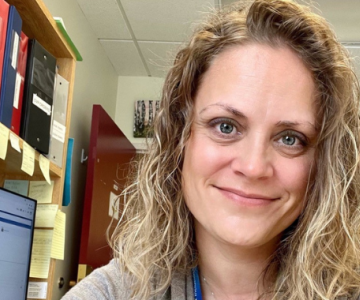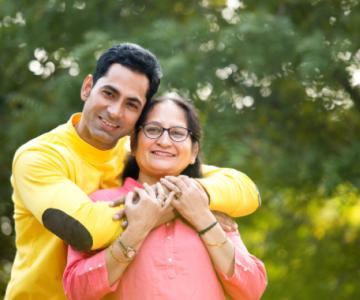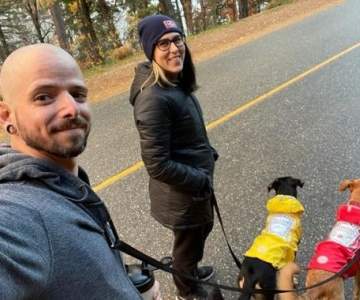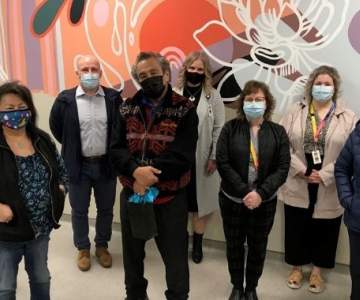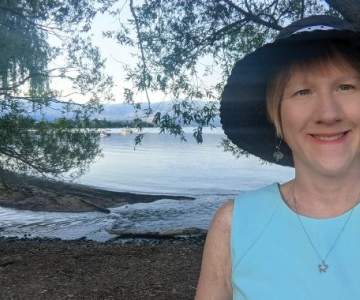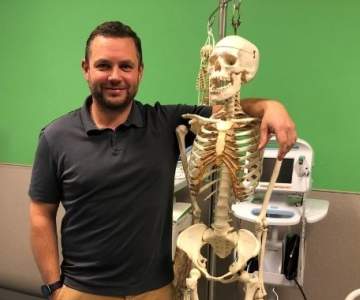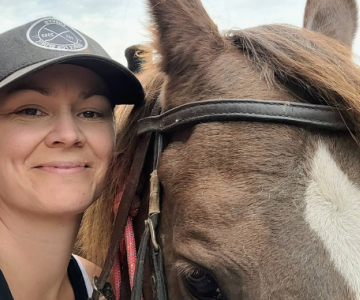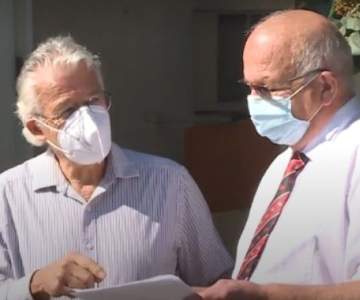Breadcrumb
Explore Stories
2 Minute Read
Community & Culture
Thea originally began her career with Interior Health six years ago as a Clerk/Receptionist in Williams Lake at Deni House, long-term care. Looking for a change in pace, she worked casual in Home and Public Health before becoming a Prevention Services Assistant in Public Health.
Thea, Her husband, and their four beautiful kids
One of Thea’s proudest career moments has been her time assisting the Williams Lake Thompson Rivers University COVID-19 Mass Vaccine Clinics. She collaborated with nurses, admin, security teams and Red Cross volunteers to keep the clinics running smoothly. Her co-workers inspire her daily through their positivity and willingness to help.
“Becoming the keeper of the vaccine has been a challenging role in the ever-changing pandemic, but I enjoy the behind-the-scenes work that keeps me on my toes.”
Being born in B.C. and growing up in the West Chilcotin has allowed Thea to enjoy an active outdoor lifestyle year-round. When she’s not working, Thea loves kayaking on the lakes, hiking in the mountains, kickboxing and doing mud runs.
Thea enjoying one of her favourite activities, kayakingAbove all, getting to spend time with her family and friends is what she enjoys the most. Recently there has been an exciting addition to Thea’s family as she has welcomed the arrival of her first grandchild!
We are IH is a recognition campaign to spotlight Interior Health employees and medical staff – through pictures and stories.
Name: Thea Telford (She/Her)
Job Title: Prevention Services Assistant (Vaccine Clerk)
Years of Service: 6
Worksite: Public Health
Community: Williams Lake
Ancestral Territory: Secwepemc
Advice to live by: Everyone is fighting a battle you know nothing about. Be kind. Always.
To keep the We Are IH loop going, Thea nominates Erin Domenko:
“Erin Domenko always goes above and beyond in everything that she does. She is always willing to help, no matter what needs to be done and her dedication is second to none.” –Thea Telford
Stay updated with careers at Interior Health
Facebook | Instagram | LinkedIn
3 Minute Read
Health & Wellness
Becoming a caregiver can creep up on you. Maybe it starts with dropping by your mom’s house to do her laundry or taking your dad to a doctor’s appointment or delivering groceries to your friend. Maybe you call your adult daughter every day to check in because she suffers from depression. Gradually, you find yourself doing more and more as the person you are caring for needs more support. You may not even realize it; you are making a commitment to care for someone else.
Other times, caregiving is triggered by a major health event or acute diagnosis, such as a serious fall, motor vehicle accident, stroke, heart attack or cancer diagnosis. Life as you know it shifts, and all your energy goes to caring for the person who needs you. In an instant, caregiving becomes your new normal.
People new to caregiving often feel:
they don’t know what they don’t know
overwhelmed by information and trying to sort out who their care providers are
unsure of what resources or programs exist for the person they are caring for
Caregiving doesn’t come with a crystal ball.
Given the complexity and ever-changing role of caregiving, caregivers often feel better when they are prepared and supported. The first stages of caregiving can feel like the most challenging. Caregivers often feel uncertain about the future, and feel the least informed about what’s happening, what’s needed and expected.
Finding the right information is a first step. This often includes:
Getting the best possible diagnosis. It may take a lot of calls, tests and appointments with the family doctor and specialists, but caregivers and the person they are caring for find it helpful to know what disease they are dealing with and what symptoms to look for.
Determining what supports you need. It can be time consuming to find the supports you need, but it is a very important step. Supports can include information, emotional support, and access to publicly-funded or private resources. Try to think about the specific types of support you need. For example, if the person you are caring for had a stroke, you may need more information about aphasia, the type of stroke, how it affected the brain, mobility and communication, and rehabilitation available in your community.
Learning new skills. Depending on the diagnosis, you might need to learn new skills to care for your loved one. Start by asking your health-care team. Disease-specific programs and caregiver support are also helpful. For example, you may be faced with a complicated medication regime or a rehabilitation program or transferring someone from a wheelchair to a bed.
Although it may seem overwhelming at first, there are lots of resources to help. A great way to get started is to check out Family Caregivers of BC’s Caregiver Learning Centre.
This story was originally published by Family Caregivers of BC
About the author
Wendy Johnstone works with Family Caregivers of BC and has close to 20 years of experience working with family caregivers. She provides one-on-one coaching and helps caregivers to build their skills, understand the resources available to them and gain confidence in their important role.
3 Minute Read
Health & Wellness
I first experimented with tobacco as a kid. My mom and step-dad smoked at home all the time, so it felt like a natural thing. I hated it at the time, but as I got a bit older I discovered Indonesian clove cigarettes. My friends and I liked their smell and sweet taste and they became our "party cigarettes".
Over time I switched to regular cigarettes because they were cheaper. And by the time I was 16 I was smoking a pack of cigarettes a day.
“Looking back, I realize I was struggling with anxiety.
I didn't know it at time, but I knew when I smoked I felt better.”
On New Year’s Eve of 2013, my wife suggested we both quit smoking the next day. I was all for it, but it actually took me years to successfully quit.
I really wanted to quit but wasn't sure I was ready. A year later I had cut down a lot, but I still smoked occasionally when I felt stressed out. My mom's health had really started to suffer because of the habit and I wanted better for myself and my wife. But I still relied on cigarettes when I felt anxious.
“Understanding that I was using cigarettes to manage my anxiety
helped me to finally kick the habit years later.”
Over the next few years I really cut back and had periods of not smoking at all. I didn't want to smoke anymore and didn't want to use cigarettes to deal with stress. I started looking for help to quit and tried nicotine patches, gum and vaping.
Vaping ended up making my addiction worse because of how convenient and accessible it is compared to cigarettes.
Nicotine spray is what eventually helped me get through the cravings.
In early 2021 I finally became smoke and vapour free. I've been learning how to deal with my triggers (stress and anxiety) in other ways, and I've also found I can't stand to be around cigarette smoke.
My physical and emotional well being has really improved since quitting. But the thing I'm most proud of is taking this step so I'll be a positive example in my family. When I have kids some day, I don't want them to have a parent who is a smoker and give them the bad example that I had at home. That was the reason I was introduced to cigarettes in the first place.
It took almost eight years after I promised myself and my wife to quit, but it's finally happened. And I think this time I'm not going back.
About the author
Marcel lives in Nelson in the traditional territory of the Ktunaxa, the Syilx, and the Sinixt peoples. He is 37 and works as an IT project technician.
Are you ready to make a change?
Changing behaviour is an individual journey but the right support can make all the difference. Here are three ideas to help get you started:
Get informed and find out about supports available to help you by checking out our Tobacco and Vaping resources.
If reducing or quitting smoking or vaping is on your 2022 list, speak with your pharmacist about the BC Smoking Cessation Program.
Share your journey to quit or reduce tobacco use or vaping and inspire others to achieve their goals. Email us to get started.
3 Minute Read
Health & Wellness
Within the non-descript walls of a clinic in downtown Kelowna, a health-care team is doing amazing things.
The Outreach Urban Health clinic includes family doctors, nurse practitioners, registered nurses, and social workers. They collaborate with mental health and substance use clinicians who are all working at the same location, to support a range of people, including those who are homeless, those dealing with mental illness, people with problematic substance use, as well as people without access to traditional health-care services, such as new immigrants.
“We are very proud of the new Outreach Urban Health site and the care that is being provided to some of the area’s most vulnerable people. Bringing over the primary care team from the original clinic on Leon Avenue and adding mental health services means that clients are now able to access care for all of their health needs within one location. This is having a really positive health impact for many of the people we see,” explains clinical operations director Danielle Cameron.
“Our goal was to create this new space to be bright and inviting, where health-care providers can offer culturally sensitive, inclusive, trauma-informed care to anyone that needs and wants it. Our teams continue to build trust with new and existing clients and the surrounding neighbourhood.”
The team at Outreach Urban Health offers a wide variety of health-care services. From giving COVID-19 vaccinations, writing and renewing prescriptions, providing vital specialist referrals, offering education on safer injection techniques for a person who uses drugs, or ensuring a client has shoes to wear, their services run the gamut - but their commitment to the population they serve is singular.
Since opening in March 2021, Outreach Urban Health has provided more than 3,000 appointments.
“This is a comprehensive medical centre offering a full suite of services to those most vulnerable in addressing both mental health and addictions. Our community is fortunate to have a facility such as this," said City of Kelowna bylaw services supervisor Ken Hunter after a recent tour of the clinic. "Interior Health has really stepped up to the plate here and there should certainly be focused community awareness to this – it truly is a good news story.”
Much of the care team’s efforts are focused on establishing familiarity and trust with clients. For example, a young street worker with multiple chronic illnesses and significant substance use issues was very nervous about accessing the health-care system, even though her health was rapidly failing. After one mental health and substance use worker invested time getting to know her and building trust, he was able to encourage her to connect with the primary care team. That young person became a regular patient, receiving much needed medical attention. She has left behind life on the streets, has a full-time job, is no longer using drugs, and her health issues are under control. This story demonstrates the impact of the care team’s collaborative, “one-stop-shop” approach.
It’s an approach that benefits many different types of clients and patients. For example, Devon is a peer worker who provides overdose prevention and harm reduction supports to those living in shelters and supportive housing. He finds the new location a great improvement for several reasons including the inclusion of supervised consumption services on site.
“The indoor supervised consumption site is much more functional for the staff and the patrons. I also have my doctor there, so it’s a one-stop-shop,” he says. “Supervised consumption is a service that’s really needed, especially in the downtown area. It’s not a matter of enabling people or encouraging them to use drugs. It’s about providing a place where people can go to use their drugs and know that they won’t die, instead of using in an alley all alone. It’s there to save lives.”
Learn more about Outreach Urban Health.
Photo above: Interior Health staff and community members gathered with Westbank First Nation elder Grouse and Edna from the Friendship Centre, to mark the opening of the newly relocated Outreach Urban Health clinic in spring 2021.
3 Minute Read
Community & Culture
Dr. Amanda Wilmer is no stranger to the B.C. Interior. While she was born in Vancouver, Amanda grew up living in Squamish, Williams Lake, Kamloops and Grand Forks, all before the age of 18. Amanda moved back to Vancouver to complete her formal education at UBC, but was delighted to have the opportunity to return to the Interior after finishing her training – having family in the area makes it feel like home.
Amanda is always willing to do whatever it takes to ensure high-quality care is provided to patients. For her, it’s been meaningful to come back to the Interior as a Medical Microbiologist at Kelowna General Hospital (KGH).
“It’s a pleasure to work with the rest of the laboratory team, who are similarly quality and patient care-oriented, to improve access to testing for all patients across IH.”
When Amanda first came to IH, no molecular testing was available for diagnosis of viral infections, such as influenza, and patients were waiting up to five days for results. Through collaboration with the KGH and Colin and Lois Pritchard Foundations, the KGH lab obtained the needed testing equipment.
“Through KGH Facility Engagement funding, my team was able to validate the equipment and our proposal was approved for trial funding of respiratory virus testing at KGH lab in winter 2017. The trial was successful, and testing was subsequently expanded to all microbiology labs region-wide. This infrastructure was key to the ability of labs to quickly adopt testing for COVID-19.”
Amanda describes herself as ‘energetic,’ and seeing her love for water activities drives that home.
“I love spending time on the water. Whether it be paddle boarding, kayaking, wake surfing, scuba diving or just floating – the water is my happy place.”
Amanda also enjoys hiking and snowboarding. She and her husband, James, spent as much time as possible leaving the city when living in Vancouver, so coming back to the outdoor playground of the Interior has been amazing.
Despite loving where she lives, Amanda is also looking forward to travelling again.
“I love visiting new places, experiencing new cultures, trying new foods and enjoying beautiful scenery. Before COVID-19, I travelled a lot, and am hoping to continue these adventures once things settle down!”
To keep the We Are IH loop going, Amanda nominates Hope Byrne
“Hope Byrne is an amazing person, but also an outstanding leader who has been so instrumental in improving patient care by ensuring the best laboratory services are being provided in IH. She has worked tirelessly (often days, nights and weekends) during the COVID-19 pandemic to ensure the lab is able to provide timely and high-quality results. She also serves as a mentor and inspiration to many others in the laboratory, and somehow finds time to also do her MBA!” – Dr. Amanda Wilmer
We are IH is a recognition campaign to spotlight Interior Health employees and medical staff – through pictures and stories.
Name: Dr. Amanda Wilmer (she/her)
Job Title: Medical Microbiologist
Years of Service: 7
Worksite: Kelowna General Hospital
Community: Kelowna
Ancestral Territory: Syilx Okanagan
Favourite Quote: I can't change the direction of the wind, but I can adjust my sails to always reach my destination.
Stay updated with careers at Interior Health
Facebook: Interior Health | Instagram: interiorhealthbc
| LinkedIn: Interior Health Authority
4 Minute Read
Research & Innovation
Dr. David Cruickshank is an orthopedic surgeon at Royal Inland Hospital who is part of the team who is now able to send patients home with hip and partial knee replacements on the same day as their surgery. His skeleton pal helps the orthopedic surgeons educate patients on their joints.
Years of intensive equine riding events and weightlifting took a heavy toll on Shelby Roblin’s knees – so much so that she has lived with pain for the past 10 years.
When the COVID-19 pandemic forced the postponement of elective surgeries across B.C., she expected she would be waiting a lot longer for relief.
Instead, thanks to innovative planning and two enthusiastic surgeons, she got her long-anticipated partial knee replacement in December at Royal Inland Hospital in Kamloops.
Now she is looking forward to the second procedure, particularly because she knows that once again, no overnight stay will be required.
“My surgery was in the morning; I saw the physio at one and I left the hospital at 2 p.m.”
Shelby has been in hospital before when she had to stay for several nights and “it was not very pleasant.”
So when her orthopedic surgeon Dr. Chris Dusik told her she would be able to sleep in her own bed the night of the surgery, she was ecstatic.
Shelby Roblin was thrilled to get a partial knee replacement in early December and even happier to find out she was going home the same day.“Dr. Dusik did a fantastic job. I have had no pain or infection. I slept well and was up walking about in the morning. I would recommend going home that day to anyone who fits the criteria. It is just so much better for recovery,” said Shelby.
She added that because the hospital did not need to find a bed for her, she was able to get in for her surgery much sooner. Seven days after her surgery, Shelby was still glowing about her short hospital stay and the success of her knee replacement.
As a patient, Shelby met the criteria for the program. She is 51 and had her adult son at home to provide some support during the recovery period. Basically, suitable patients must be fairly young, reasonably healthy and have someone at home to help them.
Until recently, all patients getting hip, knee or shoulder replacements stayed in hospital a minimum of one night.
Dr. Dusik and his partner Dr. David Cruickshank proposed the idea of a day-care joint program for their patients as a solution to a difficult problem for people who had been waiting years, often in pain, for orthopedic procedures.
The team started with hip replacements, moved into partial knees, with shoulder replacements coming next.
The results have been “incredibly successful,” with virtually no complications, said Dr. Cruickshank. He said patients are overwhelmingly positive about the experience. When the surgeons check in with them the next day, they are all rested and up using their new joints with minimal pain.
Both surgeons are looking forward to broadening the program to include more patients once more physio resources are available.
“Expanding the program would mean the ability to complete significantly more surgeries in the context of bed shortages. Ultimately, this would translate into shorter wait times and decreased health-care costs,” said Dr. Dusik.
There’s no reason not to expand when the cost savings and positive feedback from both patients and providers are considered, added Dr. Cruickshank.
Denisa Urban, who works in surgical process improvement in Kamloops, credits the surgical improvement team for creating something really positive during the challenging circumstances of the pandemic.
“We have a very dedicated multi-disciplinary team who is keen at preserving patient safety and satisfaction. The results are due to a really fantastic team who came together to achieve a common goal,” she said.
Dr. Tyler MacGregor, perioperative medical director at Royal Inland Hospital, performs most of the orthopedic procedures in Williams Lake and said patients are extremely grateful for the new program.
Bonnie Markland was the first patient at Cariboo Memorial Hospital to have her surgery in the morning and head home the same day. Dr. MacGregor proposed the idea for her hip replacement, noting she was a prime candidate.
It also appealed to her because it meant she would have surgery earlier given she wouldn’t need to stay overnight in hospital.
“I had been living in pain for about four years so I was willing to do that. I was a little nervous about how the pain would be managed, but it worked out fine. I would highly recommend it. It was great to be able to have the surgery locally and go home to my own bed.”
Same-day joint replacement surgeries also take place at Kelowna General, Penticton Regional, and Vernon Jubilee.
3 Minute Read
Community & Culture
We are IH is a recognition campaign to spotlight Interior Health employees and medical staff – through pictures and stories.
Name: Michaela Ashbee (she/her)
Job Title: Privacy Advisor
Years of Service: 7
Worksite: Community Health Services Centre
Community: Kelowna
Ancestral Territory: Syilx Okanagan
Favourite Quotes: “Everything happens for a reason.” - Anonymous
“Live life to the fullest!” - Anonymous
Michaela Ashbee has come a long way – literally – to her current role as a Privacy Advisor with Interior Health.
Born in a small town in (what was previously) East Germany, her family emigrated to Kelowna after her parents spent three amazing weeks in Canada to attend a family wedding and travel throughout B.C. Since 1993, Michaela has lived in Kelowna, not only attending school and university here, but also creating her own life and family.
“It was a big step for our family, but we’ve never looked back. We love not only living in this beautiful country, but also becoming Canadians!”
It wasn’t a straight path to her current role: Michaela spent seven years in the car industry in administration and accounting, then the beverage industry for eight years as administrator for the B.C. Interior. In 2015, she joined Interior Health as an Information Privacy Assistant, then moved to Information Privacy Analyst later that year. After going back to university and achieving her certification with the Canadian Institute of Access and Privacy Professionals (CIAPP), Michaela moved in to her current role.
Michaela enjoys helping people, seeing them succeed and achieving their goals. Those who work with her would not be surprised to hear Michaela describe herself as a passionate, dedicated go-getter who strives to exceed her goals. However, she also wears her heart on her sleeve and is a team player who loves to help others.
“I love being challenged and continuously learning new things. I don't do 'boring' well, which is the reason I like how fast-paced my current role is. Not only do I get to do what I love every day, but I work with such a diverse group of people and departments that keep sharing their knowledge and expertise with me and make every day an adventure!”
Michaela cannot pinpoint just one memorable aspect of her job. She’s had the opportunity to lead incident investigations for IH, as well as assist leaders with revamping processes and educating teams to help make IH a better, safer place.
The most recent big change for Michaela was leaving the Okanagan and relocating to the beautiful Kootenays, the traditional territory of the Ktunaxa Nation. Her family loves the outdoors so much that they’ve made the move from city life to country life.
If she’s not playing outdoors with her four big pups, enjoying horses, camping at a friend’s ranch, taking pictures or playing in the dirt while gardening, you can find Michaela at a hockey rink with her husband of 13 years, Brett, cheering on their 12-year-old son, Dominic, or local hockey teams. She also volunteers as a team manager and Grand Forks Minor Hockey Association Board Member.
A little-known fact is that in 2010, Michaela had the privilege of being an Olympic Torchbearer, running with the Olympic Torch in Kelowna.
Michaela was in a car accident in 2016, which resulted in a long term hip injury that’s limited the activities she’s able to do. But she’s pushed to find a new normal and always tries to live life to the fullest!
Michaela is looking forward to: “Enjoying every day, new adventures, new opportunities and getting to know my new community, and being a part of it to help it grow and thrive.”
Michaela's nomination keeps the We Are IH loop going:
“Paula Cyra is an amazing nurse, educator, mom, hockey billet mom and volunteer – and just has so much passion for helping others! Even her latest selfless venture of donating a kidney to a complete stranger is nothing short of amazing!" – Michaela Ashbee
Stay updated with careers at Interior Health
Facebook | Instagram | LinkedIn
2 Minute Read
Community & Culture
Across our region, local governments are supporting COVID-19 recovery and working hard to keep their communities safe.
Whether by encouraging people to get booster shots, or sharing information on how we can protect our communities from the new Omicron variant, municipal leaders bring a trusted, local voice to people in the community.
Two great examples are Armstrong Mayor Chris Pieper and Denis Delisle, an Area Director for Rural Enderby with the Regional District of North Okanagan. Both have been engaged, local champions promoting COVID-19 vaccination efforts in their communities.
Throughout the vaccine rollout in Armstrong, Pieper has directed city staff to advertise vaccination clinics in the community and through the city’s website and social media. He also visited a mobile vaccination clinic and shared his encouragement on Instagram to go get vaccinated!
“I fully support the COVID-19 vaccination program,” says Pieper. “It will help us return to some kind of new normal”. He also encouraged those who are hesitant about getting a vaccine to research trusted resources and “make a life saving decision to get vaccinated.”
Delisle continues to come up with innovative ideas for how to encourage Enderby residents to get vaccinated, and where additional drop-in vaccination clinics could be located.
“It’s clear to me that COVID-19 kills and injures people and its effect on people’s mental and economic well-being has been devastating,” says Delisle. “Please step up and get vaccinated. Do your part to keep our communities safe.”
Both Pieper and Delisle spoke on Global News to raise awareness of the low vaccination rates in their communities and encourage people to go get vaccinated.
"These local leaders in the North Okanagan have shown great leadership and care towards the safety and recovery of their communities, says Janelle Rimell with Interior Health's Healthy Communities, Healthy Families team.
"Thanks to all community leaders for your support and advocacy during these challenging times. Your efforts to promote trusted sources of COVID-19 information and encouraging community members to get vaccinated and to get booster shots will help our entire province fight this pandemic and deal with the new Omicron variant."
About the author
Janelle Rimell is an Environmental Health Officer with the Healthy Communities, Healthy Families team at Interior Health. This team works alongside local governments to create physical and social environments that support good health for everyone.
2 Minute Read
Health & Wellness
The language we use to talk about people with substance use disorders can bring out many negative stereotypes.
Substance use disorders are more highly stigmatized than any other health condition. This is largely due to the misinformed idea that addiction is a moral failing. Research shows that many people with substance use challenges have also experienced trauma, making them vulnerable and putting them at further risk of self-stigma by internalizing the negative messages they hear.
Stigma is a major barrier that prevents people from getting well. When we use stigmatizing language, we inadvertently block people from reaching out for help. This applies to the person with a substance use disorder, but also to their loved ones - stigmatizing language can have serious negative impacts on the family and friends of those with a substance use disorder, or those lost to overdose.
The shame caused by stigma also drives people to use alone, putting them at increased risk of harm.
Research about the impact of stigma shows that although people who use drugs alone understand the risks of a fatal overdose, the shame of coming forward and asking for help is
felt so strongly that they choose to hide their drug use.
Some people also feel stigma about carrying a naloxone kit. The stigma continues if a person is receiving methadone or Suboxone because their friends and loved ones may feel you are treating a drug with a drug.
Let's think about how the language we use might feel to someone living with a substance use disorder. Think about how your words would sound to a mother who just lost a child, or to someone grieving the loss of their best friend.
The toxic drug crisis continues.
In B.C. the 1,782 suspected illicit drug toxicity deaths between January and October 2021 are the highest ever recorded in a calendar year.
It's important that we reduce stigma around people who use drugs and ensure that everyone has access to the health-care services they need, where and when they need them.
You can make a difference!
Take the pledge online with Addiction Matters Kamloops to:
NOT use words or labels that are stigmatizing like addict, abuser, junkie or crack head.
Encourage others to use non-stigmatizing language and to understand the impacts of stigma on individuals and families impacted by substance use.
Use language that is compassionate and respectful when discussing addiction or someone who uses substances.
Think of the individual as a person, and not define them by their illness.
-
Load More
Showing 405 of 677
STAY CONNECTED
Receive news and alert posts, and Stories@IH blog posts, right to your inbox!

